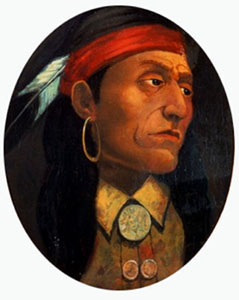|
|
Chief Pontiac
Pontiac's War was the most successful First Nations resistance to the European invasion in our history. Though it failed to oust the British from native lands, the conflict forced British authorities to a recognition of native rights that has had had far-reaching consequences down to our own time. In late July 1766 a great council convened at Fort Ontario (Oswego), deep in Seneca country on the southeast shore of Lake Ontario. A weary superintendent of Indian Affairs William Johnson had called together the chiefs of the Great Lakes nations in order to find an end to the war.
It had not gone well for the British. A loose coalition of tribes in the Great Lakes and Ohio Valley area had captured nine frontier forts, killed some 2500 whites and laid siege to Forts Detroit and Duquesne for months. The war had its origins in the changing relationships of First Nations and whites after the British conquest of New France in 1763. The imprint of the French had been light, just a score of small posts and missions. The French learned the First Nations languages and customs and intermarried. The haughty condescension of General Jeffery Amherst, the British commander-in-chief, was in stark contrast. Amherst sold off native lands without regard, crushed any opposition with force, and forbade the giving of gifts, which had great symbolic significance to the First Nations.

The courageous Ottawa chief Pontiac lead the most successful Indian war against the Europeans in our history (Archives of the City of Detroit). Many chiefs played their parts in the ensuing conflict, but the greatest among them was the Ottawa chief Obwandiyag, whom the English called Pontiac. He was an imposing figure, tall strong and heavily tattooed, in the custom of the Ottawa. He fashioned his straight black hair in a narrow pompadour and wore silver bracelets on his arms and a collar of white plumes around his neck. He was courageous and commanded respect far beyond his own people.
Pontiac was inspired by the words of Neolin, the Delaware prophet, who warned his people "if you allow the English among you, you are dead. Maladies, smallpox, and their poison will destroy you totally." By the spring of 1763 Pontiac was contemplating war. With the support of the neighboring Potawatomis and Hurons, he hatched a plan to capture Fort Detroit. When a spy revealed the plan, Pontiac laid siege. Historians have called the conflict that followed a "conspiracy," "treason," or an "uprising." For the First Nations and notably for Pontiac it was a war of liberation.
The war spread for a month throughout the Great Lakes and Ohio Valley, with a series of victories that sent the British reeling. A war party of Ottawas surprised a rescue force at Point Pelee, capturing 46 English soldiers and two boats. Pontiac's success encouraged the Miamis, Illinois, Weas, Kickapoos, Mascoutens, Delawares, and Shawnees to join. The Ojibwas captured Fort Michilimackinac with their famous ruse of distracting the garrison with a game of lacrosse and following a stray ball into the fort. Pontiac then intercepted some 260 British reinforcements in a bloody encounter on the bridge across Parent's Creek (later called Bloody Run). The British, cut to pieces, hurried back to the fort. It was at this low point that Amherst made his infamous suggestion: "Could it not be contrived to send the small pox among the disaffected tribes of Indians?"
However, Pontiac's alliance slowly began to disintegrate. On 6 July, the Potawatomis dissociated themselves from Pontiac; Tak's Hurons likewise broke their alliance. Despite a final appeal by Pontiac, little by little most of his Ojibwa and Ottawa followers deserted him in October and scattered to their winter hunting grounds.
The final peace was concluded at Fort Ontario July 23-25, 1766. On July 25 Pontiac declared to Johnson "I speak in the name of all the Nations to the westward whom I command, it is the will of the Great Spirit that we should meet here today and before him and all present I take you by the hand and never will part with it."
|
|
|
|
|
 Native American Nations
Native American Nations
